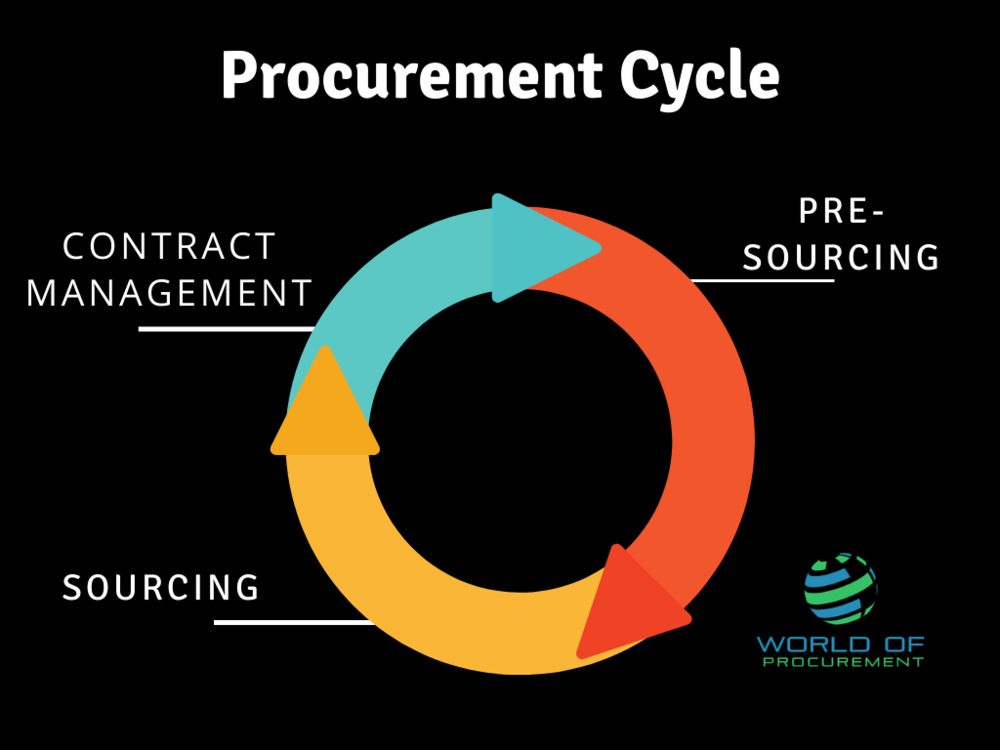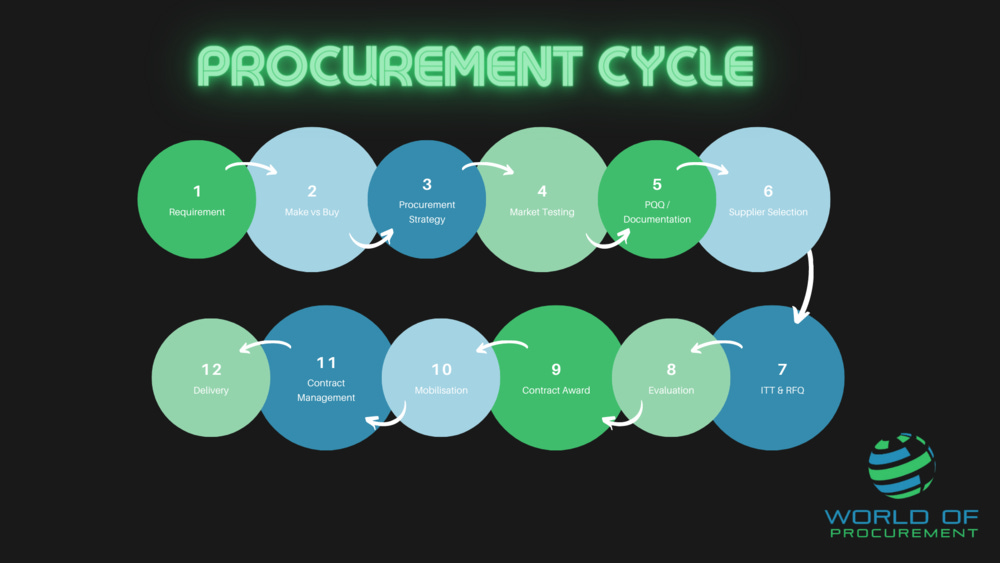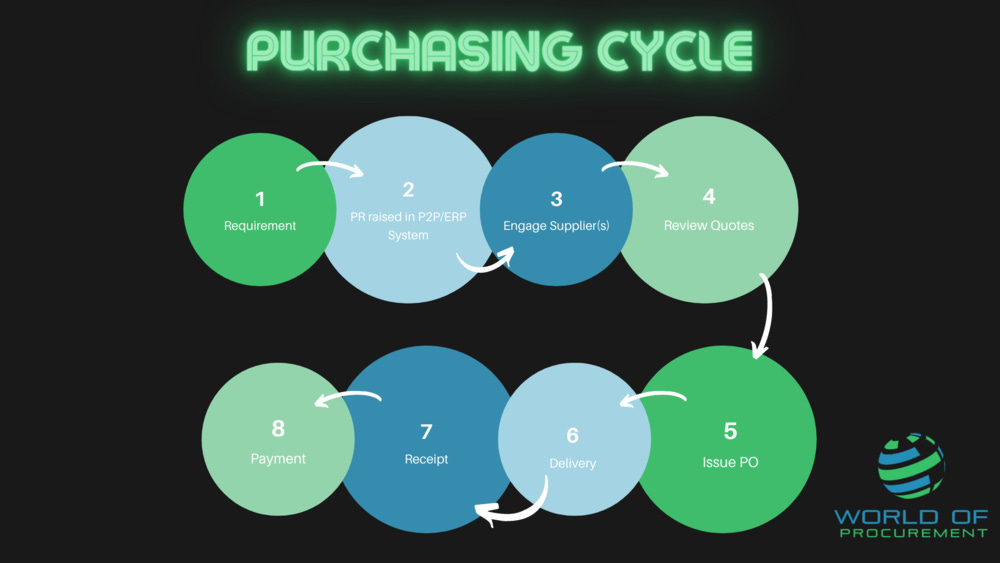Procurement Vs Purchasing - Is there a Difference?
What’s the difference between Procurement and Purchasing?
Procurement, Purchasing, we hear these terms bundled together and used as though they are inherently the same. This is a misconception and you can see this from the very literal definition of the words. We wrote about what Procurement is previously here on World of Procurement and the literal procurement definition is:
"the process or act of procuring”. It’s a simple definition and when we look further the meaning becomes deeper for the word procure means to:
To get possession of something;
To obtain something by particular care and effort;
To bring about or achieve something by care and effort.
What is Procurement and does the Procurement Definition give us that answer?
Does this truly tell us what procurement is? I’d say it goes somewhat of the way as to define what Procurement is and that helps us to understand what the difference is between procurement and purchasing.
You can see from this that Procurement is to use care, effort, skill and to achieve some goals through a specific procurement process to achieve this. Hence why we have Procurement Processes and Procurement Cycles (CIPS give a great example of this here) that need to be followed for the best possible outcome to your Procurement/Sourcing activities within the business.
Let’s consider Purchasing and what that means. The Purchasing definition is to “acquire (something) by paying for it; buy”. There is no talk of doing this with care or effort and this definition of purchasing is focussed on the act of paying and buying.
There are differences beyond the literal definition of the words. This is a good starting point for finding out the difference. If you’ve got a Procurement or a Purchasing department within your business then you are likely to have different strategic goals for the departments.
I’ve seen it. I’ve worked in a multi-million-pound business that was part of a global conglomerate worth excess of $4Billion and the part of the business that had strategic high-risk programmes in the Global Defence market only had a Purchasing Department to back it up. This was a major disadvantage.
The Purchasing team was not suitable to undertake the work that was required and the individuals did not think like Procurement Professionals. It was scary that the Business was so underdeveloped in that space.
Let’s cover more of the differences to enable you to structure your business around the best model for your strategic aims.
Here’s what we are going to cover in this article.
What we are going to cover
The Procurement Process from Pre-Sourcing - Sourcing - Contract Management
Why Organisations have a Procurement Team
What Purchasing is
What Purchasing is responsible for
The Purchasing Process
What is Procurement Responsible for?
Procurement has a great deal of responsibility and since the COVID19 Global Pandemic, the role of Procurement has become far more visible on a Global Scale. Procurement Teams should be undertaking the following responsibilities:
Identification of the Requirement and Specification Management
Marketplace analysis
Cost and Budgets
Identification of Suppliers
RFX which includes: Request for Information (RFI), Request for Quotations (RFQ), Request for Proposal (RFP)
Contracting the Supplier
This is by no means an exhaustive list but these are typically the most important elements. Within these macro headings of responsibilities are further micro responsibilities. For example, building a competitive procurement evaluation would fall into the RFX element. There is a lot to Procurement and the best Procurement Professionals are all over this.
Procurement Professionals follow the Procurement Cycle set out below for most of their procurement activities. They don’t always need to do as much work in some elements. However, each procurement will follow this Cycle.
Requirement or Specification
Make vs Buy based on Market Analysis
Procurement Strategy
Pre Procurement Market Testing
Pre-Qualification Questionnaire PQQ & Documentation Phase
Supplier Selection Phase for Tender
Invitation to Tender/Request for Quotation Phase
Tender Evaluation of Supplier Bids
Contract Award
Contract Mobilisation and Implementation
Contract Management
Delivery
As you can see, Procurement Teams have a lot of planning before they even get to the point of Contract Award. Contract Award is the moment when the contract is signed and that solidifies the pricing and the scope of services/specifications that the supplier will provide and/or deliver to.
At this point, payment is not made. Payment is made at the Delivery stage or via the use of contract milestone payments. This is significantly different from the role of Purchasing where payment is sometimes issued upfront for the delivery of both goods or services.
Why Do Organisations have a Procurement Team?
It’s a good question to start with and there are several reasons why. Think about your Organisation and how much it spends on goods or services with its Supply Chain…I bet it’s a lot. When you look at it proportionately to the amount of money your Organisation spends overall, I imagine its high.
Organisations I’ve operated and consulted in have percentages that are anywhere from 60%-90% of year spend. When you look at it proportionately you realise that it is a lot of money and Procurement controls that spend. It’s unlikely that any other department in your entire Organisation has any spend approval powers or ability to sign contracts other than Procurement, Commercial and Legal Professionals who are supporting the Procurement Team. This is a massive amount of responsibility and if Procurement Teams and Procurement Pros aren’t following the Procurement Process, and as such are not testing the market or competitively procuring, then your Organisation could be losing out on a lot of savings, value and innovation.
Procurement has further influence over how your Organisation operates. Imagine your Organisation wants to be carbon neutral
by a specific date - how do they achieve this? Your Procurement Teams are likely going to ensure that environmentally friendly requirements are issued to the Supplier, that solutions that promote this Organisation objective are scored highly in the Tender Evaluation and that new innovative suppliers are sourced from.
Procurement makes magic happen in delivering tangible Organisation targets.
Let’s discuss Purchasing and how it differs from Procurement.
What is Purchasing?
Purchasing is simply the purchasing of goods or services with the issue of a Purchase Order and standard terms of purchase. They might well utilise a Procure-2-Pay (P2P) solution to make this more efficient. Purchasing is not without thought but it does not follow the same premise of Procurement in that you do not need to follow all of the Procurement Process. With Purchasing, payment can often be issued in advance to secure delivery of the goods or services. However, this is not recommended as with any type of order, you need to ensure that you have received the goods or services and they match the requirement that has been contracted against.
Purchasing is similar to Procurement.
What is Purchasing Responsible for?
Purchasing is usually focussed on lower value requirements or low complexity procurements where it is not cost-effective to have a Procurement Professional issuing POs out of a P2P system.
Purchasing Teams are often set-up to manage inventory in areas such as Engineering and Aerospace where the parts being ordered are built into the P2P system, they are from the same few or single supplier each time and where there is little deviation in price. That’s because an Aeroplane part needs to be the same exact part in terms of look, feel and material whether it is order 1 or order 1000. Therein lies a particular skill of Purchasers that a lot of Procurement Pros aren’t always too familiar with. Purchasers deal with inventory which means warehousing and logistics are involved. You could look at Purchasing to be a part of the overall Supply Chain Profession for a particular type of requirement.
What is the Purchasing Cycle?
The process is similar to the Procurement Process.
Requirement
Purchase Requirement raised in a P2P system
Engage Supplier(s) with Order
Review Quotes from Supplier(s)
Issue Purchase Order
Delivery of goods/services
Receipt of goods/services
Payment
Purchasers still engage with the internal business partners as to what is needed. However, this may come through on the P2P system (or even ERP system depending on the size of the Organisation) and the Purchaser/Buyer will be notified of the requirement. There will usually be some process type form that approves the spend with a supplier who may have provided a quote already or whom you have a pricing list with.
Purchasers then send an order acknowledgement or a small Request for Quotation out to their Supplier(s) to confirm pricing and stock. Once the Purchaser is happy with the Quotation, they issue a Purchase Order and the goods or services are delivered. Once delivered they can be receipted and payment is issued.
Closing thoughts
Procurement and Purchasing are different. Yes, you can consider Purchasing to be a subset of Procurement. Procurement might even have set up various frameworks and other types of arrangements with Suppliers that your Purchasing Team call-off against.
For me, at the heart of it is the type of activities that are undertaken. If you are in Procurement, you are procuring goods with more effort than a purchaser. That isn’t some elitist statement. Purchasing Teams are usually focussed on goods that are of lesser value and complexity but these goods may be vitally important to the business still.
Both roles are important.
You won’t see Purchasing and Procurement Teams everywhere. You may find there are a few Purchasing Officers within the Procurement Function in an Organisation to handle large volumes of simple transactions.
As technology solutions are implemented more aggressively over the next couple of years due to the COVID19 Pandemic - we’ll see an end to Purchasing along with other roles such as the Buyer. These roles will be automated and this question will no longer be relevant.




